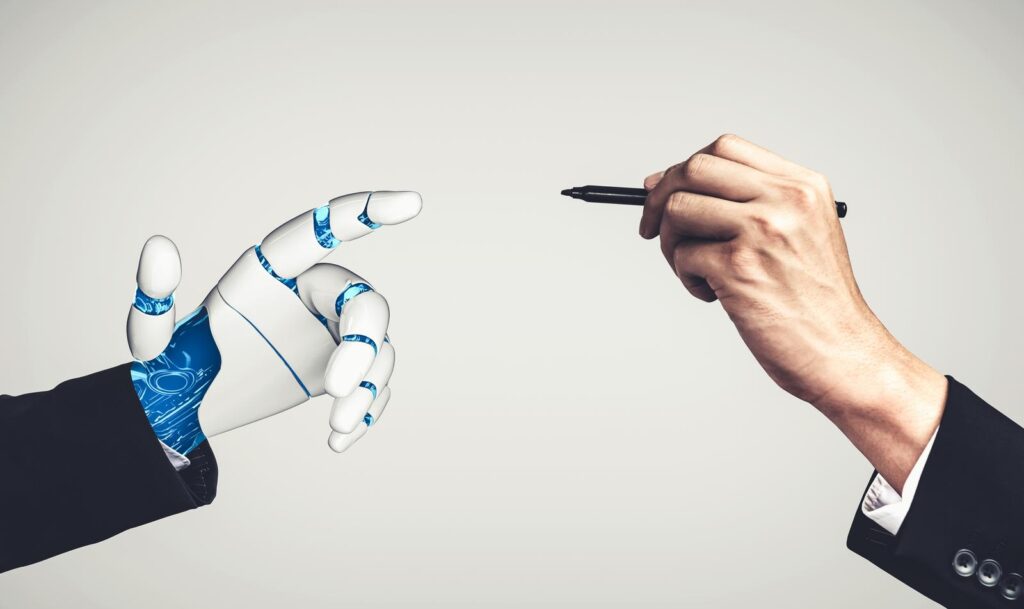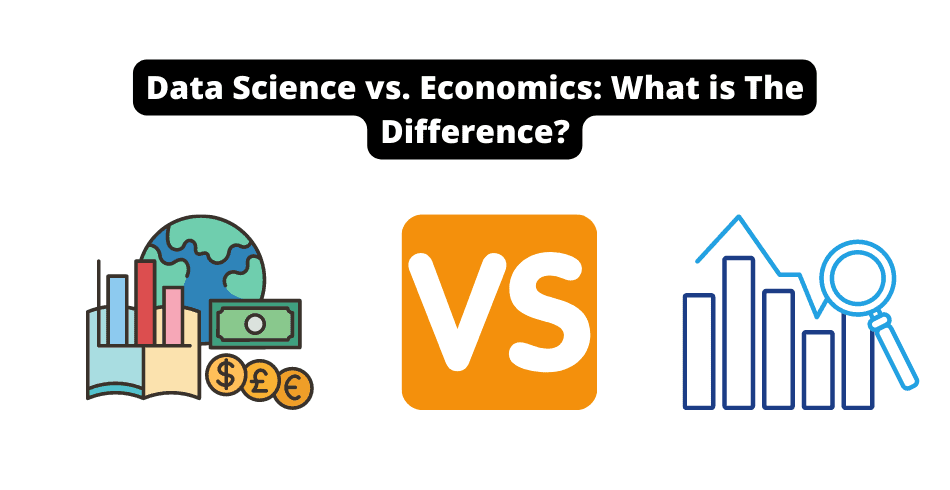When you think about it, data science and economics have a ton in common.
Both disciplines use data to make informed decisions – economists use economic data to understand how people behave when making choices about money, while data scientists use data from experiments and surveys to derive insights for optimal business decisions.
While they may sound similar, the two fields have some key differences.
This blog post will explore both the similarities and differences and discuss which one might be a better fit for you!

Difference Between Data Science And Economics
Data science focuses heavily on mathematics, computer programming, and statistical analysis to identify underlying trends in large data sets.
In contrast, economics combines theories of financial concepts such as markets, production, exchange, and even statistics to understand better how the economy works at a more macro level.
While both can utilize analytics tools to create models of their respective fields, data science is conducted within a relatively short time frame.
Where they really differ is the thought process behind the decisions made in economics and data science.
When an economist makes a decision, they make decisions based on how it will affect the whole economic system (country, state, etc.)
This decision criterion is much broader and on a macro scale compared to data science decision-making, where decisions are usually derived from accuracy metrics relating to a business decision.
This changes the core ideologies in these fields, as data scientists usually optimize for now based on current metrics, and economists are focused on the future, basing their decisions on many factors.
Another huge difference between data scientists and economists is their “fields.”
Most economists are research-based, where academia leads the charge for some leading insights on the field.

For example, John Mayard Keynes came up with Keynesian Economics (modern-day economics) while studying at Kings College.
This is opposite to what you’ll (most likely) do as a data scientist, where you’ll work for a private company solving business problems.
If you’re really weighing the options between the two, understanding which industry you’d enjoy working in more is critical.
Reference:
https://en.wikipedia.org/wiki/John_Maynard_Keynes
What Do Data Scientists Do?
Data Scientists a relatively new and unknown buzzword in the tech world – but they are becoming essential to organizations across all industries.
Data scientists use their coding, logical reasoning, statistical, and mathematics knowledge to analyze massive amounts of data to draw insights from them for their business needs.
This data doesn’t always come easy; they sort through masses of structured and unstructured data to massage this data until it’s usable.
This is only part of what they do; they also uncover hidden trends and correlations, create accurate predictive models, and leverage raw data to develop strategies that directly benefit a business’s bottom line.
With the right skills and expertise, data scientists can become invaluable resources for companies looking to maximize efficiency or increase their competitive edge.

What Do Economists Do?
Economists study financial markets, global economic trends, and people’s behavior regarding how they spend their money.
They analyze data to determine how economies change over time, what effects government policies have on an economy, and predict future economic events.
Economists love the past; economists review data from previous economic cycles to make policy recommendations for governments, businesses, and other organizations.
Understanding the history of economic data can be a real asset for making predictions about the future.
Though it’s not all in the past, economists look at employment figures and use mathematical models to forecast business activity. (Sound Familiar??)
They often research strategies for creating new jobs or improving labor conditions within our communities.
Economists provide valuable insights into how economies work and how these factors might impact the average person’s lifestyle now and in the future.
Do Economists or Data Scientists Use Machine Learning?
Data scientists and economists love machine learning.
How could they not?
Both sets of jobs involve understanding systems that are so complex – that we need a computer.
That’s where machine learning comes in.

It gives another set of eyes and ears to munge over the data to help us understand it better.
For economists, this means more accurately predicting the effects specific policies will have on the markets and their participants.
On the other hand, data scientists can use machine learning to identify trends and build solutions that will bring tremendous value to their customers right away.
Machine learning has touched every single industry, and data science and economics are no different.
Though, I will say – data scientists use machine learning much more than economists.
While machine learning is the heart beat of data science, it’s a tool in the toolbox for an economist.
Can I Transition to Data Science From Economics?
If you’re considering shifting from economics to data science, you’re in luck – you’re already almost there.
As an economist, you understand looking at data on a macro level and interpreting it for matters of a vast system (like the economy).
This makes transitioning to data science far more straightforward than coming from a completely unrelated background.

With data science, you’ll be able to make even more meaningful interpretations of data as you lower your scope to a micro level for specific business needs.
Almost all businesses now depend on analysts to derive insights from their collected data to improve decision-making, a valuable skill in any industry.
If you were nervous about this transition – don’t be; you’re in the PERFECT spot.
Can I Transition To Economics From Data Science?
Transitioning from data science to economics can be a rewarding experience.
After all, if you already understand business problems at a smaller scale, you’re halfway there to understanding large-scale decision-making and how those decisions impact an extensive system like the economy.
Of course, one of the challenges with this transition is getting familiar with finance – but don’t worry!
With dedication and the right resources, you can feel confident getting up to speed in the fast-moving finance world.

After all, economics is an ever-evolving field that allows for revolutionary opportunities in today’s digital world – making what may seem like a problematic transition fun and exciting.
Is There A Role That Is Both Data Science And Economics?
A quant is a perfect blend of the theoretical approach of economics and the experimental and practical methodology of data science.
Quants create mathematical models that predict how an economy will behave, employing state-of-the-art data science techniques to build these models and draw conclusions from their findings.
Because of this, quants bring together expertise in both fields to figure out how an economy or sector works and, more importantly, why it works that way in certain circumstances.
Moreover, by using sophisticated algorithms to analyze large datasets and visualize the effects on economic behavior, quants can decipher patterns to spot trends before anyone else and gain insight into financial markets with near-perfect precision.
Most of the time, quants employ their skills in the stock market, trading stocks at high volumes to make money for their clients.

This job is perfect for someone with the knowledge of an economist and the skill of a data scientist.
Data Science VS Economist Salary
According to my research, economists make around $100,000 a year on average.
Some top-paying companies are Baker McKenzie, DLA Piper, and the IFC.
While you’d do very well as an economist, you’d also do well as a data scientist.
Data scientists, on average, make around $125,000 a year, a 25% increase over their economist friends.
This makes sense, as those who drive value for companies are usually compensated much higher.
Reference:
https://www.glassdoor.com/Salaries/economist-salary-SRCH_KO0,9.htm
https://www.glassdoor.com/Salaries/data-scientist-salary-SRCH_KO0,14.htm
Which has a better future: An Economist or a Data Science Career?
While economists are great – machine learning is the future.
If I had to choose which field to go into, I’d run toward machine learning.

Machine learning is slowly taking over the world, and while there will always be a need for economists, the demand for data scientists with skills in machine learning is unmatched.
There’s a reason it was voted the sexiest job of the 21st century.
Reference
https://hbr.org/2022/07/is-data-scientist-still-the-sexiest-job-of-the-21st-century
Economics Degree VS Data Science Degree, Which Is Better?
While an economics and a data science degree are great, I’d suggest a statistics, computer science, or math degree.
Economics and Data science will hone you into one field for the rest of your life, which is great if you can do the same thing for 40 years.
However, if you pursue a statistics, computer science, or math degree, it would open you up to the world of STEM, able to contribute anywhere (like economics or data science) that these mathematical principles are applied.
Which Programming Languages Do Economists and Data Scientists Use?
Since both of these disciplines rely heavily on data – from market trends to customer surveys – they need programming languages designed for this challenge.
Therefore, it’s probably not a shock that economists and data scientists must have had a firm grip on modern programming languages like SQL, Python, and R.
These languages allow for easy storage of large datasets, model creation, and fast analysis to drive insights at the speed of light!
Other This Or That Articles
We’ve written a couple of other articles that are very similar to this one; check out:
- Data Science vs. Bioinformatics
- Machine Learning vs. Programming
- Machine Learning vs. Automation:
- Full Stack Developer vs. Machine Learning Engineer
- Data Science vs. Operations Research
- Machine Learning vs. Human Learning
- Heuristic Algorithm vs. Machine Learning
- Do Software Engineers Make Good Money on Reddit? [Discover the Truth] - February 27, 2026
- Do People in Software Sales Make Good Money? [Discover the Shocking Truth Inside] - February 27, 2026
- Discover which PMS software does Marriott use [Unveiling the Industry Secret] - February 26, 2026

